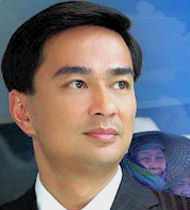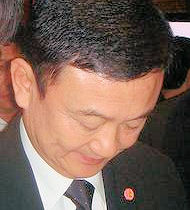A diplomatic passport of convicted former Thai prime minister has been revokedThailand's ex-premier and convicted criminal Thaksin Shinawatra has lost his diplomatic passport (a privilege offered to all former prime ministers), after failing to appeal an abuse of power case. Thaksin's diplomatic passport was revoked effective 12 December 2008, while Thailand was under a caretaker government.
The Foreign Ministry said the decision was made after Thaksin failed to appeal a 21 October 2008 verdict of Supreme Court that sentenced him to 2-year imprisonment for abuse of power when he was P.M. in 2003. The court found Thaksin guilty of wittingly allowing his wife, Potjaman, to scornfully bid on Bangkok's prime plot of real estate at a discounted value at a government auction.
The ministry announced its decision on Monday 15 December 2008, after the Thai Parliament voted 235-198 to elect the opposition Democrat Party leader Abhisit Vejjajiva as Thailand's next prime minister, which was a real blow to Thaksin's role as a behind-the-scenes political master.
Thaksin, who was P.M. from 2001 to 2006 before being ousted by a nonviolent military coup, lived in self-imposed exile, mostly in London, until February 2008, when he returned to Thailand after the pro-Thaksin People Power Party (PPP), the second reincarnation of Thaksin's Thai Rak Thai Party (outlawed by the military junta), came to power.
Nepotism, cronyism along with the paybacks are common practices in Thailand's politics. Two past Prime Ministers Samak Sundaravej and Somchai Wongsawat had close ties to Thaksin:
Samak, a self-described "nominee" for Thaksin, who lost his premiership on 9 September 2008, when the Constitution Court found him guilty of moonlighting by hosting a TV culinary show while in office;
Somchai, a Samak's successor, who was disqualified as prime minister on 2 December 2008 by the ruling of Constitution Court that found his party (PPP) guilty of vote-buying in last general elections held on 23 December 2007, was Thaksin's brother-in-law.
In August 2008, Thaksin fled again after his wife was sentenced to 3-year in jail* for tax evasion. Two months later, Thaksin officially became a fugitive from justice after the Supreme Court sentenced him in absentia to 2-year imprisonment and issued a warrant for his arrest.
In early November 2008, the UK authorities revoked the former first couple's tourist visas, forcing Thaksin and Potjaman to give up their London home. Later on 15 April 2009, the Thai Foreign Ministry has revoked Thaksin's ordinary passport. For more details refer to Thai Politics Part II.
It's been reported that Thaksin has been offered and accepted other countries passports and "honorary citizenship". He declined to name them, stating: "I better not mention the names of those countries, but I have several documents."
The saga continues...
à±¼ à±¼
Ousted billionaire Thai premier thanks junta for saving his moneyMoney has long been and still remains a determining factor in extending Thaksin's political life. Those who have been around long enough can see a lot of turns since Thaksin's heyday. On 2 March 2009, Thaksin planned to appear in person at the Foreign Correspondents Club in Hong Kong. After Thai authorities announced they would attempt to have him arrested, Thaksin canceled his live appearance and was speaking by video link from Dubai to Hong Kong instead.
"I don't know whether I should condemn or thank the military junta when they froze my assets in Thailand, otherwise I probably would have invested in the stock exchange and lost", Thaksin said.
Thaksin has been the key figure in Thai politics since 2001 when he and his Thai Rak Thai Party came to power on a platform of populist policies. Having secured the backing of Thailand's rural and urban poor, Thaksin went on to consolidate a monopoly over Thailand's political system by undermining independent bodies, intimidating critics and pushing through economic programs that benefited his family and political cronies.
He lost the support of Bangkok's middle class and Thai political elite in early 2006 when he sold his family's shares in Thailand's leading telecom group, Shin Corporation, to Singapore's Temasek Holdings in a tax-free deal, netting the clan some US$ 2 Billion.
Ending months of anti-Thaksin protests, the military junta toppled Thaksin in September 2006 and put in place an interim government. Now-defunct Assets Scrutiny Committee acting on behalf of interim authorities froze Shinawatras' bank assets worth an estimated ฿ 76 Billion (~US$ 2.1 Billion).
Although he has denied it, Thaksin was rumored to have plenty of cash abroad, part of which he used to purchase the UK Manchester City football club for US$ 162 Million in July 2007. Later on, in 2008, he sold the club to Sheikh Mansour bin Zayed al-Nahyan of Abu Dhabi at a sizable profit of US$ 120 Million, shortly before being denied a British visa.
Earlier in 2006, while setting up the UK as the preferred alternative for staying in exile, the tycoon billionaire bought several luxurious properties. Thaksin owns a £ 3 Million penthouse in Kensington, West London, and a £ 4.5 Million mansion in Weybridge, Surrey.
"I just have enough to finance my traveling and living standards, which is more than one dollar a day," Thaksin, 59, who lives in exile to avoid a jail term back home, was quoted as saying of his current fortune. The once all-powerful man was also more conciliatory towards his foes, although his offer of talks to end the political struggle in Thailand is unlikely to be trusted.
Now that Thaksin is a lot poorer, there have begun splits within the opposition Puea Thai Party, the third reincarnation of Thaksin's Thai Rak Thai Party, and amongst his loyalists and cronies. It's an open secret that his red-shirted backers have been paid to participate in rallies, demonstrations, and protests (refer to Thaksin's Movie Clip). A fugitive on the verge of being extradited from wherever in the world he stays at, his time in Thai politics may finally come to an end.
Living in exile, Thaksin needs to be careful not to offend potential places of sanctuary. He already lost his preferred home abroad, when British authorities revoked his visa. Also, Japan will not grant him a visa. And now, it gets trickier to find countries that will allow him to enter. In February 2009, he was spotted in Nicaragua in talks with President Daniel Ortega. Is it a sign of desperation?
à±¼ à±¼ 
Information and Visa Application Inquiries
One Million Baht Prize Money to Get ThaksinA prize money of ฿ 1 Million has been offered to bring fugitive ex-PM Thaksin Shinawatra back to Thailand. Thaksin and his red-shirt supporters from the United Front for Democracy against Dictatorship (UDD) have been accused of instigating the ongoing political conflict and blamed for slandering the royal institution and insulting the monarchy, both clandestinely and publicly.
A group of retired bureaucrats, former top brass army officers, senators, academics and business people, calling themselves "United Siam", made an offer at a press conference at the Rajabhat Suan Dusit University. The One-Million-Baht (some US$ 28,600) bounty for Thaksin's arrest was made on 6 April 2009, after Thaksin heavily criticized the Privy Council President General Prem and certain other privy councilors to the King.
Over the past week, former premier Thaksin has addressed his red-shirt supporters gathering outside the Government House via a video link-up (allegedly) from overseas. In his nightly speeches, he was threatening a "people's revolution". The United Siam group members called on the public to rise up against the red shirts.
A one-million-baht reward for tycoon multi-billionaire Thaksin is actually looked more as an insult. Or, is it a political ploy or publicity stunt on the part of United Siam, a private group of Thailand's elite?
Meantime, the red-shirt protest continues. Bangkok's massive anti-government rally scheduled for 8th April 2009 is expected to swell up to 100,000. Ahead of the mass rally, Thaksin's three children, ex-wife Khunying Potjaman, and close family members including brother-in-law and former prime minister Somchai Wongsawat have fled the country. They flew to Dubai in the United Arab Emirates, Hong Kong, and England.
Thaksin's ex-wife Khunying Potjaman Damapong is currently out on a Five-Million-Baht bail while appealing her case*.
à±¼
* à±¼ On 31 June 2008, the Criminal Court found Potjaman Shinawatra guilty of intentionally avoiding a tax payment of ฿546 Million for the transfer of 4.5 Million of the Shinawatra Computer and Communications' shares. Also found guilty are Potjaman's brother Bannaphot Damapong and her personal secretary Kanchanapa Honghern. The court sentenced Potjaman and Bannaphot each to three years in jail and Kanchanapa to two years.
à±¼ à±¼ Thaksin's Recent WhereaboutsThe Ministry of Foreign Affairs is trying to verify reports that on 4 April 2009, Thaksin was allegedly spotted near the residence of Cambodian prime minister Hun Sen. Thailand is expecting clarifications from Cambodian government in a manner similar to Lao PDR, where it made clear that Thaksin is banned from entering its territory.
On 6 April 2009, Foreign Minister Kasit Piromya warned Cambodia that bilateral ties could be adversely affected if ousted premier Thaksin Shinawatra is allowed to launch political attacks from that country. In a row, Prime Minister Abhisit Vejjajiva said that he is expected to discuss with his Cambodian counterpart Hun Sen the border dispute between the two countries.
à±¼ à±¼ Ex-PM Thaksin Shinawatra narrowly escaped arrest in Kuala LumpurThe Malaysian government had cooperated with Thailand counterparts and planning to arrest the fugitive former prime minister Thaksin Shinawatra on learning of he was staying overnight from 4 to 5 of July 2009 at Shangri-la Hotel in Kuala Lumpur.
It was reported that Thaksin was vigilant enough to escape arrest and flew to the Pacific island country of Fiji by his private jet. Last Friday, 10 July, he flew back to Dubai.
à±¼ à±¼ Ex-PM Thaksin Assigned as Adviser to Cambodian PM Hun SenOn 27 October 2009, at the request of Cambodian PM Hun Sen, the King Norodom Sihamoni signed a Royal Decree to appoint former Thailand PM Thaksin Shinawatra as an official adviser to Prime Minister Hun Sen and the Royal Government of Cambodia. Concurrently, the Cambodian government repeated its refusal to extradite Thaksin if requested.
A master of manipulation, fugitive ex-Thai PM Thaksin said that it's an honor for him that the Cambodian government appointed him as an economic adviser for the premier and the government.
The ties between Cambodia and Thailand have been soured since June 2008 amid a border conflict over the land surrounding the 11th century Preah Vihear temple. But relations have cooled further since Hun Sen made his initial invitation to Thaksin last month.
On 5th November 2009, Thailand recalled its ambassador to Phnom Penh to protest against the appointment of convicted ex-premier Thaksin Shinawatra as an economic adviser to Cambodian Prime Minister Hun Sen and his government.
The decision to recall Thai ambassador is the strongest protest in years. The Thai government has said that all ongoing cooperation between the two nations would be put on hold for the time being. Thaksin's appointment is viewed as an insult to the Thai justice system.
In return, the Cambodian government announced to temporarily recall its Ambassador to Thailand. It stated: "Allowing Thaksin to stay in Cambodia is virtuous behavior... good friends need to help each other in difficult circumstances."
On 10 November 2009, Thaksin arrived in Phnom Penh to take up a job of economic adviser to Cambodian government. He flew in a private plane that landed at a military airport, and was then escorted by a convoy of cars under tight security to the capital Phnom Penh to a hero's welcome.
Apart from having Hun Sen as his best friend, Thaksin has another Cambodian connection - Pat Supapa, one of the richest businessmen in Cambodia and a chairman of Koh Kong International Resort Club. He was one of the high-profile citizens who welcomed Thaksin. à±¼ à±¼
The thriller continues at... Thai Politics Part II. | |




